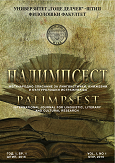EXPLICIT INSTRUCTION OF PRONUNCIATION LEARNING STRATEGIES AND WORD-STRESS RULES: EXAMINING LEARNERS’ REFLECTIONS FROM DIARY ENTRIES
EXPLICIT INSTRUCTION OF PRONUNCIATION LEARNING STRATEGIES AND WORD-STRESS RULES: EXAMINING LEARNERS’ REFLECTIONS FROM DIARY ENTRIES
Author(s): Anastazija Kirkova-Naskova, Ivana Duckinoska-MihajlovskaSubject(s): Higher Education , Pedagogy
Published by: Универзитет »Гоце Делчев« - Штип
Keywords: pronunciation learning strategies (PLSs); word-stress rules; Covert Rehearsal Model (CRM); learner diaries.
Summary/Abstract: Pronunciation learning strategies (PLSs) have attracted researchers’ attention with their potential for achieving pronunciation improvement (e.g., Pawlak & Szyszka, 2018). Studies aimed to identify suitable PLSs for learners (Peterson, 2000) and to explore strategy use with different pronunciation features among learners with different L1s (Sardegna, 2022). The present study focuses on investigating types of strategies used for accurate word stress placement. Twenty Macedonian EFL learners were part of a larger experiment that tested the effectiveness of explicit instruction on four orthographic word-stress rules. During a four week-period, the participants were taught how to identify stress in polysyllabic words, received instruction on PLSs for practice based on Dickerson’s Covert Rehearsal Model (CRM) (Dickerson, 2013), and kept a diary where they recorded their strategy use. The qualitative analysis of the results reveals that most of the participants use prediction and production strategies and turn to online resources and speech models for monitoring their performance.
Journal: Палимпсест, Меѓународно списание за лингвистички, книжевни и културолошки истражувања
- Issue Year: 8/2023
- Issue No: 16
- Page Range: 179-190
- Page Count: 11
- Language: English

